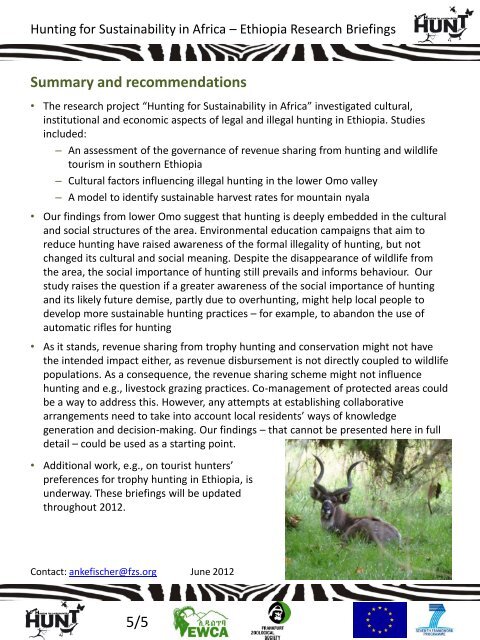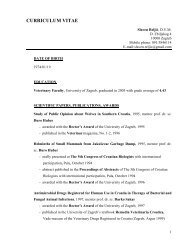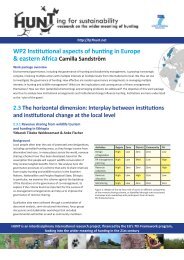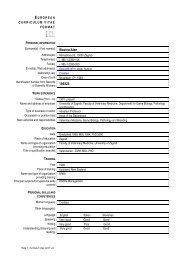Hunting for Sustainability in Africa
Hunting for Sustainability in Africa
Hunting for Sustainability in Africa
Create successful ePaper yourself
Turn your PDF publications into a flip-book with our unique Google optimized e-Paper software.
<strong>Hunt<strong>in</strong>g</strong> <strong>for</strong> <strong>Susta<strong>in</strong>ability</strong> <strong>in</strong> <strong>Africa</strong> – Ethiopia Research Brief<strong>in</strong>gs<br />
Summary and recommendations<br />
• The research project “<strong>Hunt<strong>in</strong>g</strong> <strong>for</strong> <strong>Susta<strong>in</strong>ability</strong> <strong>in</strong> <strong>Africa</strong>” <strong>in</strong>vestigated cultural,<br />
<strong>in</strong>stitutional and economic aspects of legal and illegal hunt<strong>in</strong>g <strong>in</strong> Ethiopia. Studies<br />
<strong>in</strong>cluded:<br />
– An assessment of the governance of revenue shar<strong>in</strong>g from hunt<strong>in</strong>g and wildlife<br />
tourism <strong>in</strong> southern Ethiopia<br />
– Cultural factors <strong>in</strong>fluenc<strong>in</strong>g illegal hunt<strong>in</strong>g <strong>in</strong> the lower Omo valley<br />
– A model to identify susta<strong>in</strong>able harvest rates <strong>for</strong> mounta<strong>in</strong> nyala<br />
• Our f<strong>in</strong>d<strong>in</strong>gs from lower Omo suggest that hunt<strong>in</strong>g is deeply embedded <strong>in</strong> the cultural<br />
and social structures of the area. Environmental education campaigns that aim to<br />
reduce hunt<strong>in</strong>g have raised awareness of the <strong>for</strong>mal illegality of hunt<strong>in</strong>g, but not<br />
changed its cultural and social mean<strong>in</strong>g. Despite the disappearance of wildlife from<br />
the area, the social importance of hunt<strong>in</strong>g still prevails and <strong>in</strong><strong>for</strong>ms behaviour. Our<br />
study raises the question if a greater awareness of the social importance of hunt<strong>in</strong>g<br />
and its likely future demise, partly due to overhunt<strong>in</strong>g, might help local people to<br />
develop more susta<strong>in</strong>able hunt<strong>in</strong>g practices – <strong>for</strong> example, to abandon the use of<br />
automatic rifles <strong>for</strong> hunt<strong>in</strong>g<br />
• As it stands, revenue shar<strong>in</strong>g from trophy hunt<strong>in</strong>g and conservation might not have<br />
the <strong>in</strong>tended impact either, as revenue disbursement is not directly coupled to wildlife<br />
populations. As a consequence, the revenue shar<strong>in</strong>g scheme might not <strong>in</strong>fluence<br />
hunt<strong>in</strong>g and e.g., livestock graz<strong>in</strong>g practices. Co-management of protected areas could<br />
be a way to address this. However, any attempts at establish<strong>in</strong>g collaborative<br />
arrangements need to take <strong>in</strong>to account local residents’ ways of knowledge<br />
generation and decision-mak<strong>in</strong>g. Our f<strong>in</strong>d<strong>in</strong>gs – that cannot be presented here <strong>in</strong> full<br />
detail – could be used as a start<strong>in</strong>g po<strong>in</strong>t.<br />
• Additional work, e.g., on tourist hunters’<br />
preferences <strong>for</strong> trophy hunt<strong>in</strong>g <strong>in</strong> Ethiopia, is<br />
underway. These brief<strong>in</strong>gs will be updated<br />
throughout 2012.<br />
Contact: ankefischer@fzs.org June 2012<br />
5/5







